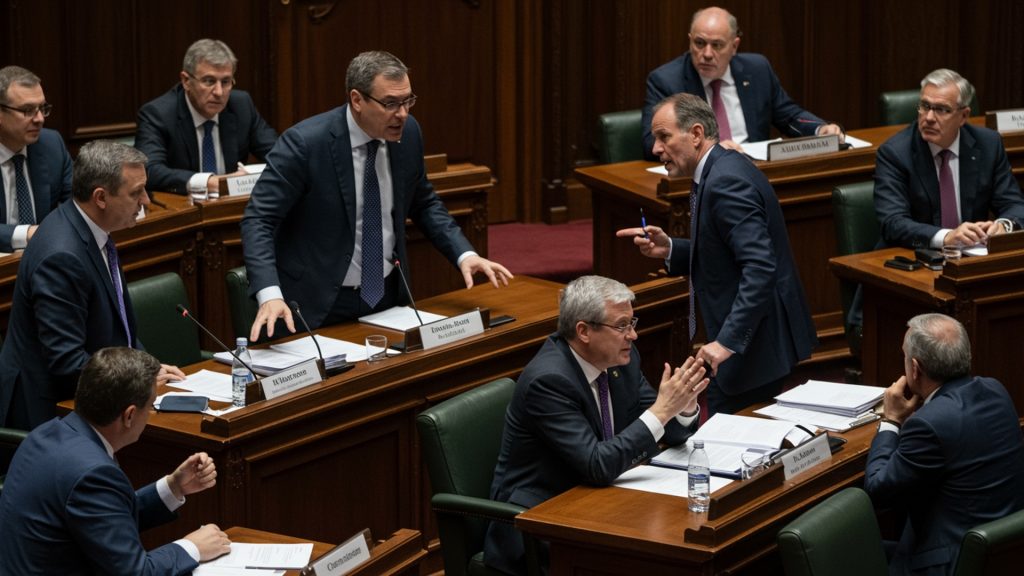The Gujarat political scene is in turmoil following the state government’s recent decision to extend the tenure of a key Cooperative Bank. This move, announced just yesterday, immediately sparked strong anger from opposition parties, who claim it is an unfair political favor and goes against good rules for how banks should be run. Critics argue that the extension of the current board’s term avoids the need for new elections, denying members a chance to pick their own leaders and potentially allowing the ruling party to keep control over crucial financial systems. The decision has raised questions about fairness and open government, pushing the issue to the forefront of public debate across the state as political leaders trade sharp words over the future of cooperative banking in Gujarat.
New Rules Stir Up Trouble
A recent decision about how long leaders can stay in their jobs at cooperative banks in Gujarat has caused a big fight among political groups. The change means that many directors, who manage these vital banks, can now stay for a longer time than before. This new rule has led to strong opinions and debates across the state.
The central government recently changed a rule in the Banking Regulation Act of 1949. This change, which started on August 1, 2025, extends the maximum continuous time a director can serve in a cooperative bank from eight years to ten years. This rule applies to all directors except the chairperson and full-time directors.
In Gujarat, this change directly affects many people. Records show that more than a thousand directors in different cooperative banks in the state had already completed their eight-year term. To be exact, 169 directors in 16 District Central and State Cooperative Banks and 876 directors in 145 Urban Cooperative Banks were over their previous limit. The new rule lets these long-serving directors continue in their positions for an extra two years.
What is the Cooperative Bank System?
Cooperative banks are special banks that are run by their members. They are different from other banks because their main goal is to help their members, not just to make a profit. These banks play a very crucial role in local communities, especially in places like Gujarat. They provide money and help to farmers, small businesses. other local people.
These banks are usually governed by elected leaders, called directors, who are chosen by the members. These directors make vital decisions about how the bank is run. To make sure new people get a chance to lead and to keep things fair, there are usually rules about how long a director can serve. These are called term limits. The idea is to bring in fresh ideas and prevent any one person or group from staying in power for too long.
Gujarat has a very large cooperative sector. It has 87,201 registered societies. This shows how deeply these groups are part of the state’s economy and social life. The cooperative banks in Gujarat deal with huge amounts of money, providing billions in loans every year. They support various sectors, from milk cooperatives like Amul to basic credit needs in towns and villages.
Why This Change Matters
The main reason for the current disagreement is the two-year extension given to directors who had already reached their eight-year limit. The government says this change is a ‘reform’. The Finance Ministry has stated that the Reserve Bank of India (RBI) now has stronger powers. The RBI can remove chairpersons who are not fit, ask for new boards to be formed. even take over the running of banks if needed. Supporters of the extension argue that having experienced directors can be very valuable, especially in banking, which can face challenges. They say that seasoned leaders can help maintain stability and manage issues like bad loans.
But, many people are worried about this extension. Critics say it goes against the idea of fair leadership changes. They argue that allowing directors to stay longer prevents new people from getting a chance to lead. It also raises concerns about favoring certain individuals or groups. the possible misuse of power.
The main concern is that these banks, despite their focus on community help, are very closely linked to politics in Gujarat. Getting a position on a cooperative bank board is not just about managing money; it’s about gaining influence and control over local funds. This makes cooperative banks a key area for political power struggles.
Different Sides Speak Out
The opposition parties have openly criticized the tenure extension. Rajya Sabha Member of Parliament, Shaktisinh Gohil, from the Congress party, has been very vocal. He called the extension less of a ‘reform’ and more of a ‘political shield’.
“This change seems to protect those linked to the ruling party, allowing them to keep their positions even after their time was up,” Mr. Gohil said. “It feels like a double standard, where some directors are allowed to stay while others, perhaps from different political backgrounds, are quickly removed.”
He has also questioned the timing of the amendment, noting that it came into effect just as over a thousand directors in Gujarat were about to finish their eight-year terms. Mr. Gohil had previously asked the government for details on how many cooperative banks in Gujarat were not following the previous eight-year limit and how many directors were affected.
On the other hand, officials from the ruling party and the government have defended the decision, pointing to the increased powers of the RBI. The Finance Minister, Nirmala Sitharaman, confirmed that the new rule took effect on August 1, 2025. She also explained that the Cooperative Election Authority will make sure the new rule is followed for multi-state cooperative banks.
“The RBI now has strong powers to ensure proper governance in cooperative banks,” the Finance Minister stated. “This includes the authority to remove unfit chairpersons and order new boards to be formed. For banks registered under state laws, the RBI will work with state governments for such actions.”
Some people within the ruling party are also reported to believe that enforcing term limits would be a good way to allow new, younger leaders to emerge, breaking the long-standing power of current directors.
Past Events and Legal Points
The issue of directors serving beyond their terms is not new in Gujarat. Even before the recent amendment, many directors continued to hold their posts for decades, despite a previous RBI rule that barred any director from serving for more than eight years. This rule was meant to promote openness and stop people from becoming too powerful in their roles. Data had shown that Gujarat had some of the highest numbers of directors serving beyond the allowed time in the country.
The RBI’s rules apply everywhere in India. how they are put into practice can be different from state to state. In Gujarat, there has not been a big effort to remove directors who have served too long.
There have also been instances where cooperative bank elections were put off due to unclear rules or legal arguments. For example, elections at the Rajkot District Cooperative Bank were postponed because of different ways people understood new RBI guidelines about candidate eligibility and board terms. In other cases, court petitions have been filed to delay election processes, arguing about when a director’s term truly ends.
The current amendment, which extends the tenure to ten years, is seen by some as a way to formally allow many current directors to stay in their positions, not just in Gujarat but across India, while still saying that there is strict RBI control to maintain good management.
What Happens Next
The extension of the cooperative bank directors’ terms is likely to remain a hot topic in Gujarat’s political discussions. Opposition parties may continue to raise this issue, especially as local elections come closer. There could also be more debates about transparency and fair practices in the cooperative sector.
The Reserve Bank of India will continue to oversee cooperative banks, working with state governments to make sure rules are followed. This includes regular checks and audits to ensure financial health and proper management. The government also says it is committed to modernizing the cooperative sector through digital tools and financial improvements, aiming for growth that includes everyone, especially in rural areas.
For the common person, the key thing will be whether these changes lead to stronger, more reliable cooperative banks that truly serve the needs of their members, or if they result in more political control and less focus on community benefits. The ongoing debate shows how essential these banks are to the state’s economy and its people.

